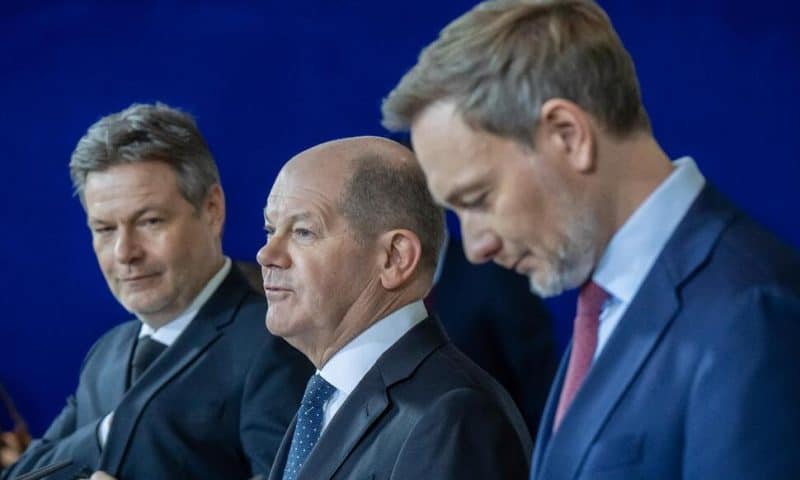Germany’s governing coalition has reached a deal to resolve a budget crisis triggered by a court ruling last month
BERLIN — Germany’s governing coalition reached a deal Wednesday to resolve a budget crisis triggered by a court ruling last month, agreeing to cut some subsidies and spending while stressing that Berlin will stick to plans to step up support for Ukraine.
Chancellor Olaf Scholz’s three-party coalition has spent weeks wrangling over how to deal with the annulment by Germany’s highest court of its decision to repurpose 60 billion euros ($64.7 billion) originally meant to cushion the fallout from the COVID-19 pandemic for measures to help combat climate change and modernize the country. That maneuver fell foul of Germany’s strict self-imposed limits on running up debt.
The immediate result was a 17 billion-euro hole in next year’s budget. Filling that in a hurry was a tall order for a coalition whose members often have different priorities. The two-year-old government has become notorious for infighting and has seen its poll ratings slump.
“The government is sticking to its aims,” Scholz said Wednesday after clinching a deal with Vice Chancellor Robert Habeck and Finance Minister Christian Lindner. “We are pushing forward vigorously the climate-neutral renovation of our country, we are strengthening social cohesion and we stand closely by Ukraine in its defense against Russia.”
“But it is clear that we must manage with significantly less money to achieve these aims,” Scholz said. He added that means “cuts and savings — of course, we aren’t doing that gladly but they are necessary.”
That will be achieved by reducing climate-damaging subsidies and slightly reducing the spending of some ministries, including the transport, environment and labor ministries, officials said.
Spending by the “climate and transformation fund,” which was directly affected by the court ruling, will be reduced by 12 billion euros next year and 45 billion euros overall through 2027. Scholz said the fund will still have “a very high overall volume” of 160 billion euros.
Carbon pricing on fuel used to drive and heat will be increased faster than previously intended to bolster its funding, while measures to modernize the German railway will be funded from elsewhere, for example through privatization proceeds. Habeck said that subsidies for buying electric cars will be ended earlier than planned and there will be less support for the solar power industry.
Top officials said before the court ruling that German aid for Ukraine would be “massively expanded” next year and have made clear recently that they intend to stick to that. There will be 8 billion euros for weapons deliveries, as well as aid for Ukraine’s budget and probably over 6 billion euros to support Ukrainian refugees in Germany, Scholz said.
If the situation in Ukraine worsens, other countries reduce their aid or the threat to Germany and Europe increases, “we will have to react to that,” he added. If that happens, the government would seek an exemption from borrowing limits.
While it generally plans to keep to Germany’s “debt brake” — something on which Lindner’s pro-business Free Democrats have been particularly insistent — it is considering seeking an exemption for the 2.7 billion euros needed next year to finance rebuilding after devastating floods in western Germany in 2021.
The debt brake, introduced more than a decade ago, allows new borrowing to the tune of only 0.35% of annual gross domestic product.
It can be suspended to deal with natural disasters or other emergencies that are out of the state’s control, and was for the three years after the coronavirus pandemic started in 2020 to allow for large amounts of borrowing to finance various support and stimulus packages.
There had been calls to suspend it again next year in the ranks of Scholz’s center-left Social Democrats and Habeck’s environmentalist Greens, who also traditionally lean to the left. Scholz said last weekend that there would be no dismantling of Germany’s welfare state to save money.
Lindner said that “there will be no reduction of social standards” but 1.5 billion euros will be saved thanks to “more accuracy” in benefits, for example by getting Ukrainian refugees into jobs.

